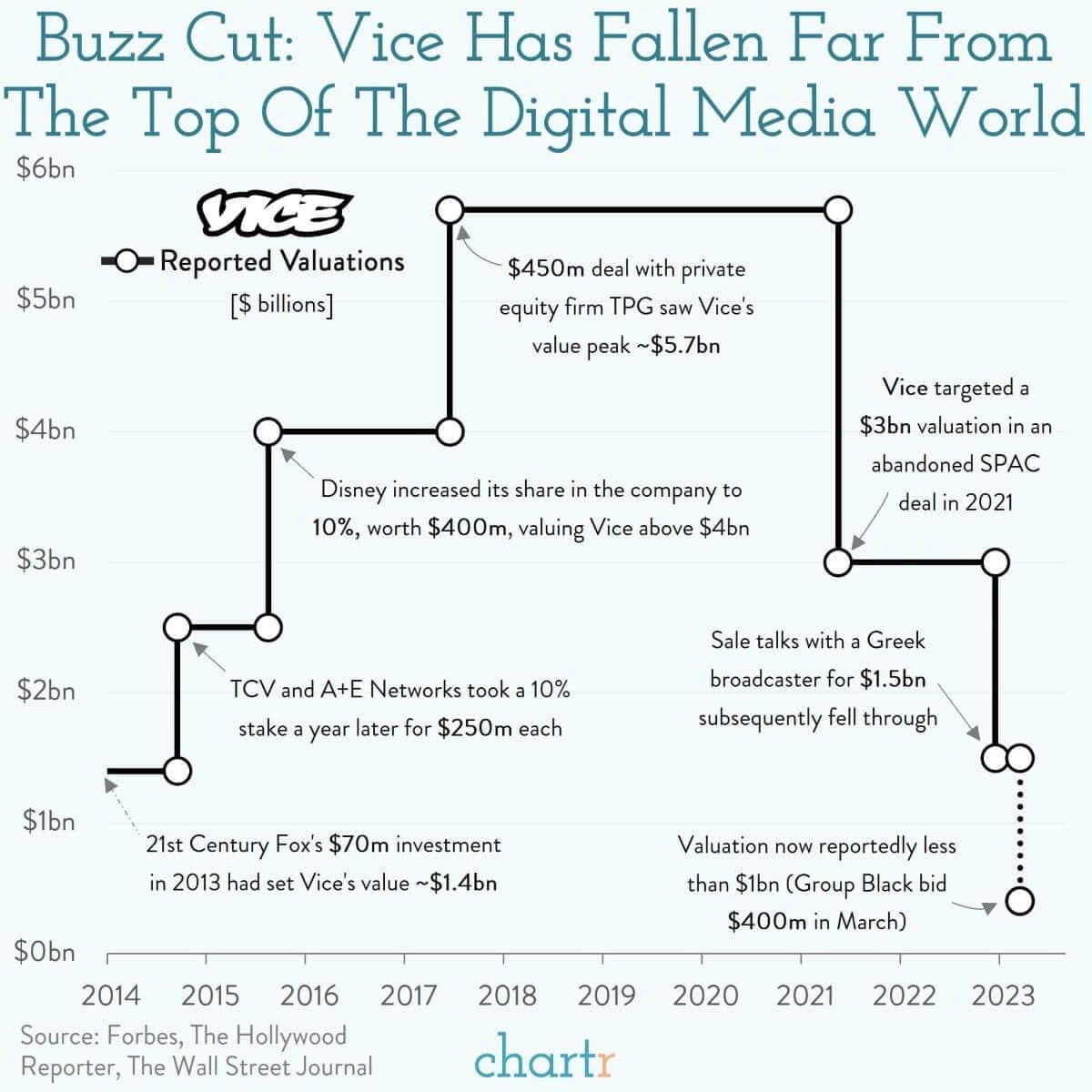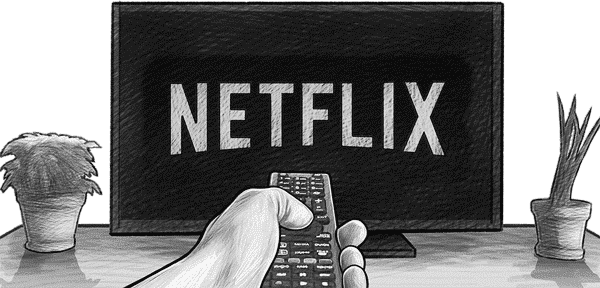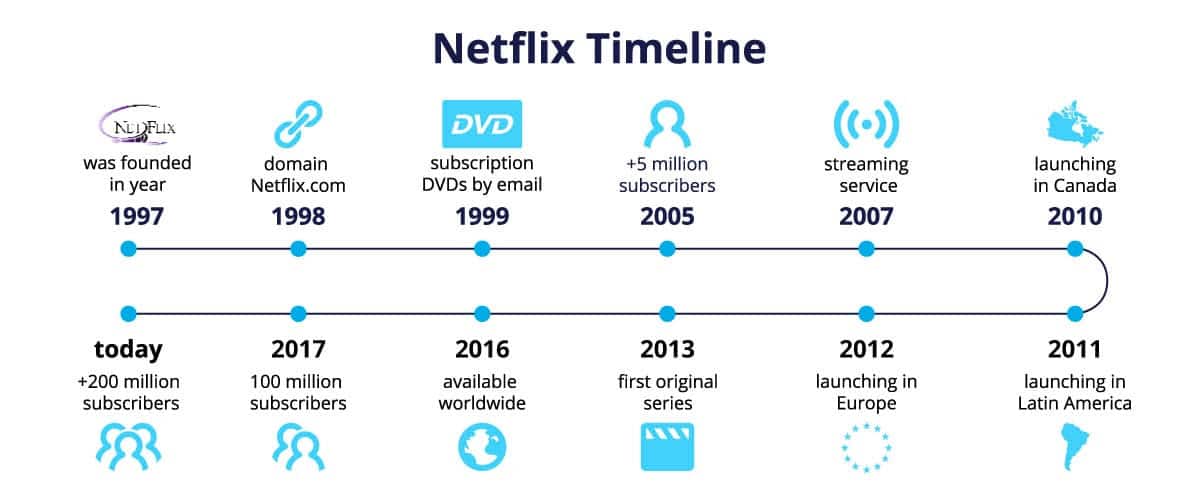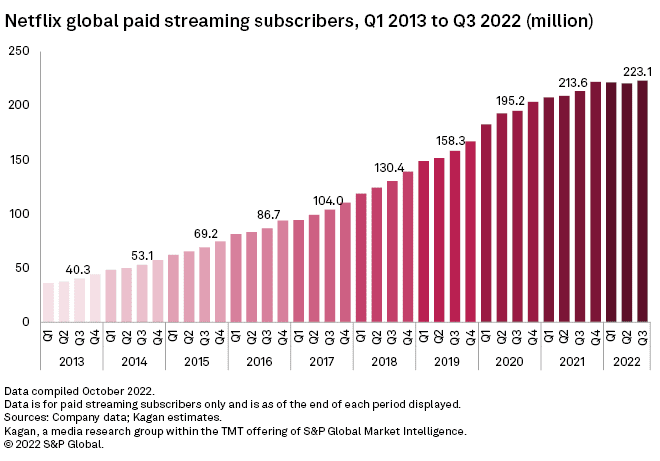Original Programming

Hi, The Investor’s Podcast Network Community!
⏰ Tick, tick, tick. Every moment that goes by without a debt-ceiling deal, the closer we are to the U.S. government defaulting on its debt.
Treasury Secretary Yellen warned Tuesday that “time is running out,” while Speaker of the House Kevin McCarthy said today that “no progress” had been made in overnight talks.
Investors’ mood has soured: In a survey of 251 investors with over $660 billion under management, 65% expect a weaker economy, and 29% don’t anticipate a debt-ceiling resolution ahead of the “X-date” (when the government runs out of money and risks default).
Happy Tuesday 😅
— Shawn
Here’s the rundown:
*All prices as of market close at 4pm EST
Today, we’ll discuss two items in the news:
- A shake-up in the media space
- Home Depot’s dreary outlook
- Plus, our main story on how Netflix took over your TV
All this, and more, in just 5 minutes to read.
POP QUIZ
In the year 2000, Blockbuster had the chance to buy Netflix, the company which would later precipitate its demise. How much was the offer? (Scroll to the end to find out).
Understand the financial markets
in just a few minutes.
Get the daily email that makes understanding the financial markets
easy and enjoyable, for free.
IN THE NEWS
❗Vice Media Files for Bankruptcy (NYT)
Vice Media filed for bankruptcy on Monday after a yearslong descent from media darling to a case study in the problems facing digital publishing.
- A group of Vice’s lenders, including Fortress Investment Group and Soros Fund Management, is in the leading position to acquire the company out of bankruptcy.
- The group has submitted a bid of $225 million, which would be covered by its existing loans to the company. It would also take over “significant liabilities” from Vice after any deal closes.
Vice was worth a staggering $5.7 billion at one point, thanks partly to investments from Disney and financial investors like TPG, which poured hundreds of millions of dollars into the business. That will all be rendered worthless by the bankruptcy.
Why it matters:
It’s a cautionary tale for other ad-supported media entities in a crowded space. Vice and its investors believed social media networks Facebook, Twitter, and Instagram would deliver them the mobile-first readers advertisers crave.
Though readers came by the millions, new media companies had trouble wringing profits from them, and most digital ad dollars went to the major tech platforms.
Last month, BuzzFeed shut down its namesake Pulitzer Prize-winning news division after going public at a small fraction of its earlier valuation, and Vox Media earlier this year raised money at roughly half its 2015 valuation.
Said one media expert: “I think even those of us running profitable media start-ups now are thinking more carefully about growth and making sure we can continuously define our audience and the value we represent to them.”
🏠 Hope Depot Projects First Annual Sales Decline Since 2009 (WSJ)
Retail giant Home Depot expects annual sales to decline for the first time in over a decade as consumer spending in home improvement projects tightens.
The home-improvement chain said Tuesday that it projects sales to fall between 2% and 5% in fiscal year 2023, rather than stay flat as it had guided for in February.
The Atlanta-based company said its top line was driven lower by a drop in lumber prices and extreme weather conditions, particularly in California and the Western U.S., that delayed home-improvement projects.
Why it matters:
Demand for home-improvement goods, which was elevated throughout the pandemic, is softening as shoppers spend more on services. Customers are also holding off on making big-ticket purchases that can be easily deferred, said Chief Financial Officer Richard McPhail.
Professionals such as contractors and electricians, who have historically driven about half of Home Depot’s revenue, are still reporting healthy backlogs but also finding that homeowners are opting for smaller projects and shifting away from large renovations.
The slowdown comes after three years of outsized growth in home improvement that pulled forward demand for major purchases like grills and appliances.
The pandemic fueled demand for home projects, and consumers flocked to Home Depot, sending its stock much higher in 2020 and 2021.
But its share price has been cut by about 30% from its high as consumers shift their spending to travel, leisure, and other services in 2023.
MORE HEADLINES
🏦 Berkshire Hathaway invests in Capital One, adds to Apple & Bank of America positions.
🗣️ OpenAI CEO Sam Altman testifies before Congress on AI risks.
💰 Stanley Druckenmiller pumps $400M into Nvidia, Microsoft in big AI bet.
Luck or skill?
With blockbuster series like Stranger Things, House of Cards, Narcos, Orange Is the New Black, and The Witcher under its belt, this streaming behemoth has likely lured you into a binge-watching marathon or, at the very least, piqued your interest with its popularity.
The video-on-demand (VOD) juggernaut, Netflix, hasn’t seen a meaningful slump in decades.
Clocking consistent growth annually, it raked in an impressive $31.91 billion in revenue for the year ending March 31, 2023 — a 4.96% uptick from the previous year.
There’s also the staggering $16.7 billion it spent on global content in 2022, which will remain stable at those levels for the next few years.
Its current largest markets are Europe and the Middle East (76.7 million subscribers), followed by the U.S. and Canada (74.2 million subscribers), with Latin America ranked third (41.6 million subscribers).
How did Netflix become so successful? Was it a stroke of luck as an early bird (first-mover advantage) or a well-executed business strategy?
Reinventing Netflix
It’s a mix of both. Netflix masterminds Reed Hastings and Marc Randolph had a unique vision, a sharp eye for sniffing out innovation, and a knack for handpicking top talent to expand their empire.
Back in the day, Netflix’s business model was different. Netflix.com was the first DVD rental and sales website, and since its launch in 1998, it has grown continuously and embraced technological development.
Netflix has consistently blown its competition out of the water: From 5 million subscribers in 2006 to 25 million by 2012, up to 231 million today.
In 2007, as streaming emerged, Netflix demonstrated its adaptability to the shifting landscape and capitalized on the opportunity, allowing customers instant access to series and films.
Today, Netflix is available in 189 countries, offers more than 6,500 movies and TV shows, and produces one movie a week, making it the largest streaming service in the world.
Netflix has changed its business model and services numerous times, reinventing itself as customers’ desires have also transformed.
Unique work environment
The other key driver to their success is creating the right organizational culture and making the best of any company’s most important asset — human capital.
In his book No Rules Rules, Reed Hastings, together with Erin Meyer, an expert on cross-cultural complexities in business, shares how he cultivated a unique work environment where the no. 1 rule is: There are no rules!
Though, there are cultural and organizational practices that drive the company to chase high ambitions:
Freedom and Responsibility: Netflix fosters a culture where employees have extensive freedom to make decisions, but they’re also expected to take responsibility for the outcomes. This approach aims to encourage innovation and empower employees.
Context, not Control: Instead of micromanaging, leaders at Netflix provide their teams with context and allow them to make their own decisions. This enables employees to act independently and learn from their experiences.
First-Team Mentality: Employees are pushed to prioritize the company’s success over that of their specific teams or departments, cultivating a collaborative and supportive environment. The expression “Act in Netflix’s best interests” permeates throughout its corporate culture.
Talent Density: Netflix focuses on hiring and retaining the best talent, and they aren’t hesitant to let go of employees who don’t meet their high-performance expectations. As Hastings often says, “Adequate performance gets a generous severance package.”
No Vacation Policy: Netflix has no formal vacation policy, allowing employees to take time off as needed. This approach demonstrates trust in employees’ ability to manage their own work-life balance while maintaining high performance.

Dive deeper
The book No Rules Rules is a must-read for understanding how culture impacts business success.
TRIVIA ANSWER
Blockbuster could’ve bought a young Netflix for only $50 million. Blockbuster’s CEO declined, calling it a “very small niche business.” Netflix’s market cap is now worth nearly $150 billion.
SEE YOU NEXT TIME!
That’s it for today on We Study Markets!
Enjoy reading this newsletter? Forward it to a friend.










